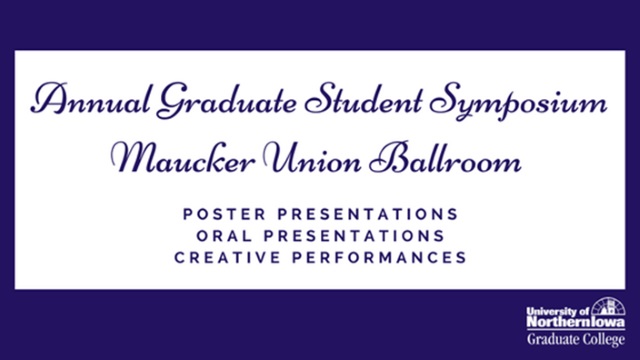
Complete Schedule
Award Winner

Recipient of the 10th Annual Graduate Student Symposium Award, Poster Presentations - First Place (2017)
To go to the Graduate Student Symposium event page, Click here
Presentation Type
Open Access Poster Presentation
Keywords
Post-traumatic stress disorder--Public opinion; Sex differences (Psychology);
Abstract
Post-traumatic stress disorder (PTSD) is a debilitating mental disorder often associated with military servicemembers. Two common types of trauma associated with PTSD in servicemembers are combat and Military Sexual Trauma (MST). MST is defined as sexual harassment that is threatening in character or physical assault of a sexual nature that occurred while the victim was in the military. Stigma, or the negative social identity attributed to a feature or characteristics of an individual, is a factor associated with both PTSD and MST. In a qualitative study, recent veterans were asked about the perceptions of a soldier being diagnosed with a mental illness using words such as “embarrassing,” “career-ender,” “no longer a soldier,” and “sign of weakness” to describe a person seeking treatment for mental health problems (Rozanova et al., 2015). Servicemembers have indicated high levels of blame and responsibility associated with the victim of MST (Burns et al., 2014). Little research has investigated the relation between civilian stigma and servicemembers with PTSD. The current study was an investigation of gender differences among stigma associated with combat-related PTSD and MST-related PTSD. Participants read various vignettes and responded to measures of attitude, stigma, perceived devaluation and discrimination, desired social distance, and perceived dangerousness. ANOVA analyses revealed an overall pattern of main effects of gender such that greater stigma was associated with the male character in general. Also, main effects of trauma type were significant such that greater stigma was associated with PTSD than a physical injury, but minimal between combat-related and MST-related PTSD. Implications and future directions are discussed.
Start Date
4-4-2017 11:00 AM
End Date
4-4-2017 1:30 PM
Year of Award
2017 Award
Faculty Advisor
Elizabeth Lefler
Department
Department of Psychology
Copyright
©2017 Marjorie Perkins
File Format
application/pdf
Embargo Date
11-1-2017
Gender Differences in Civilian Stigma of Combat-related and Military Sexual Trauma-related PTSD
Post-traumatic stress disorder (PTSD) is a debilitating mental disorder often associated with military servicemembers. Two common types of trauma associated with PTSD in servicemembers are combat and Military Sexual Trauma (MST). MST is defined as sexual harassment that is threatening in character or physical assault of a sexual nature that occurred while the victim was in the military. Stigma, or the negative social identity attributed to a feature or characteristics of an individual, is a factor associated with both PTSD and MST. In a qualitative study, recent veterans were asked about the perceptions of a soldier being diagnosed with a mental illness using words such as “embarrassing,” “career-ender,” “no longer a soldier,” and “sign of weakness” to describe a person seeking treatment for mental health problems (Rozanova et al., 2015). Servicemembers have indicated high levels of blame and responsibility associated with the victim of MST (Burns et al., 2014). Little research has investigated the relation between civilian stigma and servicemembers with PTSD. The current study was an investigation of gender differences among stigma associated with combat-related PTSD and MST-related PTSD. Participants read various vignettes and responded to measures of attitude, stigma, perceived devaluation and discrimination, desired social distance, and perceived dangerousness. ANOVA analyses revealed an overall pattern of main effects of gender such that greater stigma was associated with the male character in general. Also, main effects of trauma type were significant such that greater stigma was associated with PTSD than a physical injury, but minimal between combat-related and MST-related PTSD. Implications and future directions are discussed.



Comments
Location: Maucker Union Ballroom